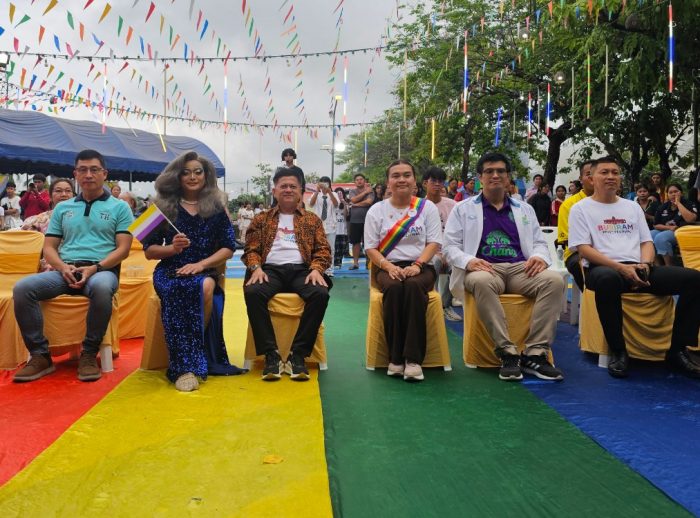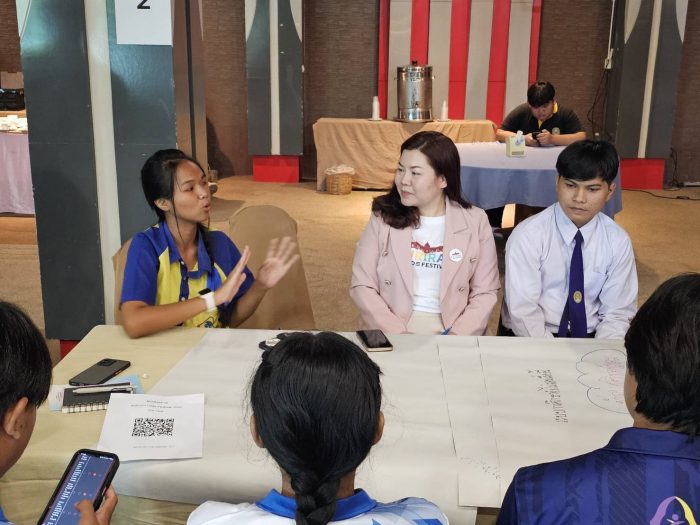
Public Policy Recommendations for Well-Being of PRIDE Youth in Buriram Province Thailand
Writer: Khanitta Saeiew, Rattana Oebking, Chalalai Juntavadee, NHCO Thailand
Editor: Danielle Thornton, St Catherine University, Menisota, USA

The Thai Senate approved an equal marriage law on June 18, 2024, making Thailand the first nation in ASEAN to have this legislation. The law will allow individuals of any gender to marry. However, there are still challenges in implementing the law, creating related policies, and implementing measures for the well-being of this group, especially for youth with diverse gender identities.
The network of synergists for well-being at the local level (Batch 2), which is a capacity-building program of the Thailand National Health Commission Office (NHCO), together with the Buriram PRIDE working group and various networks, organized a forum on developing public policies for youth and the younger generation with diverse gender identities on June 22, 2024, in Buriram Province.
Participants from various groups in this province, such as students, policymakers, teachers, doctors, the Provincial Office of Social Development and Human Security, the Provincial Administrative Organization (PAO), media, politicians, and CSOs.

Mr. Chamroen Waenpetch, Deputy Governor of Buriram Province, stated that this event provides a platform for relevant agencies to exchange experiences and listen to feedback from the target groups. The goal is to synthesize valuable information and develop policy proposals for the leaders of Buriram. This issue is of national importance, as shown by the Prime Minister’s recognition of its significance and commitment to driving this agenda forward for Thailand.
Khun Tunyawat Kamolwongwat, Deputy Chairperson of the Commission on Children, Youth, Women, Elderly People, People with Disabilities, Ethnic Groups, and Gender Diversity in the House of Representatives, stated that the inclusion of individuals with diverse gender identities in the House of Representatives demonstrates Thailand’s increasing acceptance of this issue. The goal of advancing gender diversity in Thailand should aim to achieve gender justice.
Khun Ananchai Pothikam, representative of the network of synergists for well-being at the local level (Batch 2) and a board member of the Isaan Gender Diversity Network (IGDN) Foundation, stated that Thailand has been promoting the acceptance of individuals with diverse gender identities for over 40 years. Tangible signs of this acceptance include: 1) the enactment of the Equal Marriage Law and 2) the establishment of Pride Month every year. The main issue faced by gender-diverse children stems from the prevailing notion of recognizing only two genders, male and female. The conclusions from this forum will be advanced through the Buriram Provincial Health Assembly mechanism.
The forum highlighted the main problems of youth with diverse gender identities:
1) Domestic violence: Some families do not accept same-sex marriage, leading to harm to their physical health.
2) Bullying: Problems occur in schools, workplaces, and public spaces.
3) Myths that suppress them: There is a misconception that youth or the younger generation with diverse gender identities must be intelligent and bold in expressing themselves
4) Lack of acceptance: This occurs in families, social circles, and workplaces.
5) Lack of proper restrooms.
6) Lack of proper curriculum to help students understand people with diverse gender identities.
The forum brainstormed about public policy recommendations, which can be summarized into 4 points:
- Dissemination of knowledge and understanding of gender diversity through government activities and communication channels such as village health volunteers, the Ministry of Public Health, and Thai PBS (media).
- Providing training to understand gender diversity for adults and individuals in society, especially family members, through government mechanisms.
- Establishment of all-gender restrooms, especially in schools and workplaces.
- Increasing and incorporating syllabi about gender justice and human rights at all levels of education through the mechanisms of the Ministry of Education.
